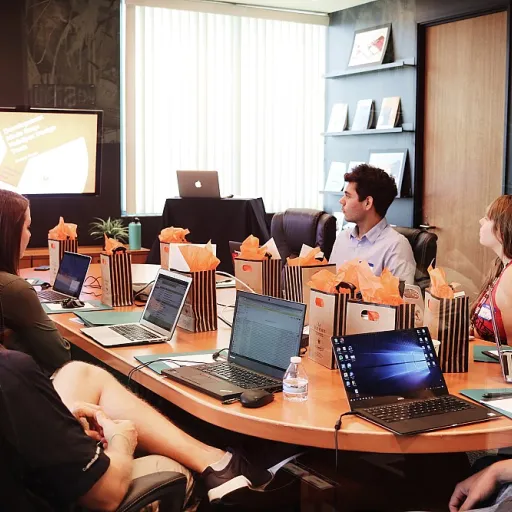
Understanding the role of a pre screening interview in recruitment process outsourcing
Why pre screening matters in recruitment process outsourcing
In the world of recruitment process outsourcing (RPO), the pre screening interview is a crucial first step that shapes the entire hiring process. Before candidates move forward to more in-depth interviews, they go through a screening interview—often by phone or video—to determine if they meet the basic requirements for the job. This early stage helps companies quickly identify which candidates will be a good fit for the position and the company culture, saving time and resources for both hiring managers and candidates.
What happens during a pre screening interview?
During a pre screening interview, candidates answer a set of screening questions designed to assess their skills, experience, and motivation for the role. The questions interviewers ask are usually based on the job description and focus on must-have qualifications, work history, and sometimes even salary expectations. The goal is to filter out candidates who do not meet the minimum requirements, so only the best candidates move forward in the hiring process.
- Skills assessment: Interview pre screening questions often focus on technical or soft skills needed for the job.
- Experience check: Interviewers confirm if the candidate’s background matches the position requirements.
- Cultural fit: Screening interviews can also touch on values and work style to see if the candidate aligns with the company culture.
- Logistics: Questions may cover availability, willingness to relocate, or work schedule preferences.
The role of pre screening in the bigger hiring picture
Pre screening interviews are not just about filtering candidates—they set the tone for the entire interview process. By clarifying expectations early, companies can ensure that only candidates who are genuinely interested and qualified progress to the next stages. This helps hiring managers focus their time on top talent and improves the overall candidate experience. For organizations using RPO, integrating effective pre screening interviews is a best practice that supports efficient, high-quality hiring outcomes.
For more insights into how sourcing services can enhance your talent acquisition strategy, check out this resource on enhancing talent acquisition with effective sourcing services.
Key benefits of integrating pre screening interviews
Why Pre Screening Interviews Matter in RPO
Pre screening interviews have become a cornerstone in recruitment process outsourcing. By introducing this step early in the hiring process, companies can quickly identify which candidates are a good fit for the job and company culture. This initial screening helps hiring managers focus on applicants who truly match the job description and required skills, saving valuable time and resources.Key Advantages for Companies and Candidates
- Efficient Filtering: Screening interviews, often conducted as a phone interview or video call, allow recruiters to assess a candidate’s communication skills, motivation, and basic qualifications before moving forward. This means only the most suitable candidates will progress to the next stage.
- Improved Candidate Experience: A well-structured pre screening interview process gives candidates clarity about the role and the company’s expectations. Candidates will appreciate timely feedback and a transparent process, which can enhance the company’s reputation as an employer of choice.
- Reduced Time-to-Hire: By using targeted screening questions, hiring managers can quickly eliminate candidates who do not meet the essential criteria. This leads to a shorter hiring process and helps fill positions faster.
- Consistency and Fairness: Standardized interview questions ensure all candidates are evaluated against the same criteria. This reduces bias and supports a fair assessment of each applicant’s skills and experience.
- Cost Savings: Early screening means fewer resources are spent on interviewing unqualified candidates. This can lower overall recruitment costs, especially when combined with outsourced appointment setting services. For more on this, see enhancing efficiency with outsourced appointment setting.
Setting the Stage for Successful Hiring
A strong pre screening interview process lays the groundwork for a successful hiring journey. It helps companies find job seekers who not only have the right skills and experience, but also align with the company’s values and work environment. By integrating pre screening interviews into recruitment process outsourcing, organizations can improve the quality of their hires and build stronger teams.Common challenges faced during pre screening interviews
Barriers to Consistency and Objectivity
Pre screening interviews are a crucial step in the hiring process, but they often come with challenges that can impact the overall effectiveness of recruitment process outsourcing. One of the most common issues is maintaining consistency and objectivity during screening interviews. When hiring managers or recruiters use different interview questions or vary their approach, it becomes difficult to compare candidates fairly. This inconsistency can lead to overlooking qualified candidates or advancing those who may not be the best fit for the position or company culture.
Communication Gaps and Candidate Experience
Another challenge is ensuring clear communication between the company, hiring managers, and candidates. If the job description or role expectations are not communicated effectively during the phone screen or screening interview, candidates may not fully understand what the job entails. This can result in mismatched expectations, leading to higher dropout rates or poor job fit. Additionally, candidates will often judge a company by their experience during the pre screening phase, so a disorganized or impersonal approach can harm the employer brand.
Time Constraints and High Volume
Recruitment process outsourcing often involves managing a large volume of candidates for multiple positions. Conducting thorough pre screening interviews for every applicant can be time-consuming, especially when resources are limited. This pressure may lead to rushed interviews, missed screening questions, or incomplete assessments of candidate skills and experience. As a result, the hiring process may not identify the best candidates for the job.
Unconscious Bias in Screening
Despite best intentions, unconscious bias can influence the outcome of screening interviews. Factors such as a candidate’s accent during a phone interview, their previous work experience, or even the way they answer certain questions can unintentionally sway the interviewer’s judgment. This can affect diversity and inclusion efforts and prevent the company from finding the most qualified candidates for the role.
Technical and Logistical Hurdles
Technical issues, such as poor phone connections or unreliable video platforms, can disrupt the interview process and create a negative impression for both the candidate and the company. Scheduling conflicts and time zone differences also add complexity, especially when screening candidates for remote or international positions.
For those interested in how recruitment process outsourcing can help overcome these challenges and open up new employment opportunities, understanding the common pitfalls in screening interviews is essential for improving outcomes and finding the right talent.
Best practices for conducting effective pre screening interviews
Preparing for a Consistent and Structured Interview
A well-organized pre screening interview is key to identifying the right candidates for a job. Start by reviewing the job description and outlining the essential skills and experience needed for the position. This helps hiring managers create relevant screening questions that align with the company’s needs and culture. Using a consistent set of interview questions for all candidates ensures fairness and makes it easier to compare responses.Focusing on Relevant Screening Questions
Effective screening interviews prioritize questions that reveal whether a candidate is a good fit for the role and the company. Instead of generic queries, focus on questions that probe into the candidate’s work history, career goals, and specific skills related to the job. For example, ask about past experiences that demonstrate problem-solving or teamwork. This approach helps hiring managers quickly identify candidates who meet the requirements and are likely to succeed in the company environment.Leveraging the Phone Interview for Efficiency
A phone screen is often the first step in the interview process. It allows hiring managers to assess communication skills, motivation, and basic qualifications before moving candidates to the next stage. To make the most of a phone interview, keep it concise and focused on the most important screening questions. Take notes during the call to capture key points and ensure an objective evaluation.Ensuring a Positive Candidate Experience
The pre screening interview is also an opportunity to showcase the company culture and values. Treat candidates with respect, provide clear information about the role, and explain the next steps in the hiring process. A positive experience during screening interviews can enhance the company’s reputation and encourage top talent to pursue a career with your organization.Documenting and Sharing Insights with the Hiring Team
After each screening interview, document the candidate’s answers and your impressions. Share these insights with other hiring managers involved in the process. This collaborative approach helps ensure that the best candidates will move forward and that the hiring process remains transparent and efficient.How technology enhances the pre screening interview process
Leveraging Digital Tools for Smarter Screening
Technology has transformed the way companies approach the pre screening interview process. Digital platforms and automation tools now play a central role in helping hiring managers and recruiters efficiently screen candidates for a job. These solutions not only save time but also improve the consistency and quality of the screening interview.- Automated Screening Questions: Many applicant tracking systems allow recruiters to set up screening questions that candidates will answer as part of their application. This helps quickly filter out those who do not meet the basic requirements for the position.
- Video and Phone Interview Platforms: Video and phone interview tools make it easier to conduct initial interviews with candidates regardless of their location. This flexibility is especially valuable for companies with remote or global teams.
- AI-Powered Candidate Assessment: Artificial intelligence can analyze candidate responses to pre screening interview questions, evaluating skills, experience, and even cultural fit. These insights help hiring managers focus on candidates who are most likely to be a good fit for the company.
- Scheduling Automation: Automated scheduling tools reduce the back-and-forth of setting up a phone screen or interview, making the process smoother for both the recruiter and the candidate.
Improving Consistency and Reducing Bias
Technology also helps standardize the interview process. By using structured screening questions and scoring systems, companies can ensure every candidate is evaluated fairly. This approach minimizes unconscious bias and supports a more diverse hiring process.Data-Driven Insights for Better Hiring Decisions
Modern recruitment platforms collect data at every stage of the hiring process. By analyzing metrics such as response rates, time-to-hire, and candidate feedback, companies can continuously refine their screening interviews. This data-driven approach leads to better hiring outcomes and a more efficient recruitment process overall. In summary, integrating technology into pre screening interviews empowers companies to identify top talent faster, improve the candidate experience, and make more informed hiring decisions. As recruitment process outsourcing evolves, leveraging these digital tools is becoming essential for staying competitive in the search for the best candidates.Measuring the impact of pre screening interviews on recruitment outcomes
Tracking Pre Screening Interview Effectiveness
Measuring the impact of pre screening interviews is essential for any company aiming to optimize its recruitment process outsourcing strategy. By evaluating the effectiveness of these interviews, hiring managers and recruiters can ensure that only the best candidates progress to the next stage, saving time and resources. One practical approach is to monitor key performance indicators (KPIs) related to the interview process. Here are some metrics that provide valuable insights:- Time-to-hire: Assess how pre screening interviews reduce the overall time it takes to fill a position. A streamlined screening process often leads to faster hiring decisions.
- Quality of hire: Evaluate whether candidates who pass the screening interview stage perform well in their roles and align with company culture. This can be tracked through performance reviews and retention rates.
- Interview-to-offer ratio: Track the number of candidates who move from the screening interview to receiving a job offer. A high ratio may indicate that the screening questions are effective in identifying a good fit.
- Candidate experience: Gather feedback from candidates about the screening interview process. Positive experiences can enhance your employer brand and attract top talent.
- Hiring manager satisfaction: Collect input from hiring managers regarding the relevance of candidates forwarded after the pre screening stage. This helps refine screening questions and interview techniques.













